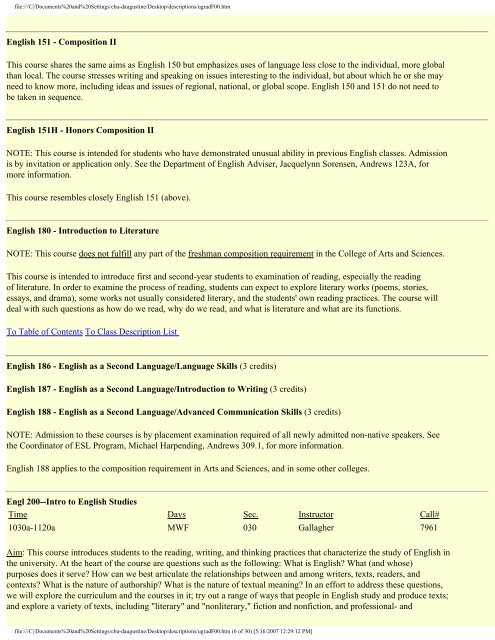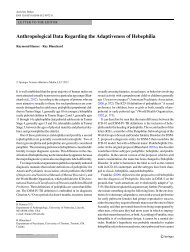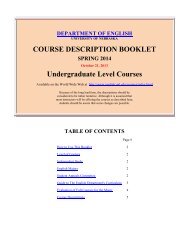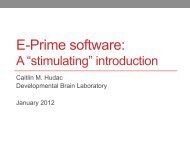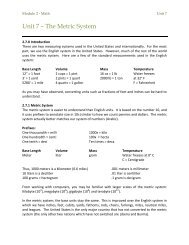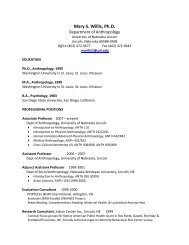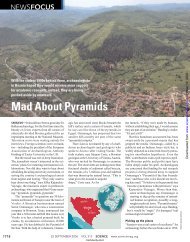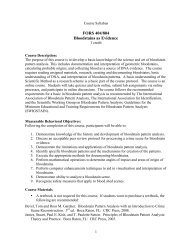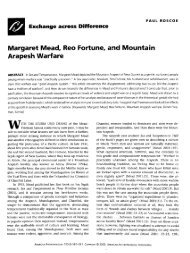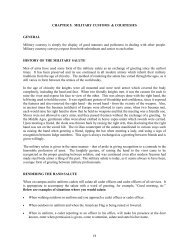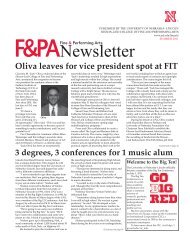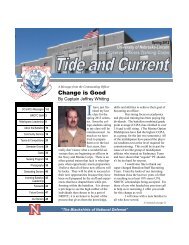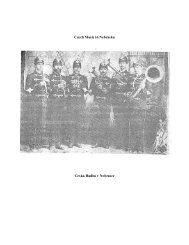Fall 2000 - The University of Nebraska–Lincoln
Fall 2000 - The University of Nebraska–Lincoln
Fall 2000 - The University of Nebraska–Lincoln
You also want an ePaper? Increase the reach of your titles
YUMPU automatically turns print PDFs into web optimized ePapers that Google loves.
file:///C|/Documents%20and%20Settings/cba-daugustine/Desktop/descriptions/ugradF00.htm<br />
English 151 - Composition II<br />
This course shares the same aims as English 150 but emphasizes uses <strong>of</strong> language less close to the individual, more global<br />
than local. <strong>The</strong> course stresses writing and speaking on issues interesting to the individual, but about which he or she may<br />
need to know more, including ideas and issues <strong>of</strong> regional, national, or global scope. English 150 and 151 do not need to<br />
be taken in sequence.<br />
English 151H - Honors Composition II<br />
NOTE: This course is intended for students who have demonstrated unusual ability in previous English classes. Admission<br />
is by invitation or application only. See the Department <strong>of</strong> English Adviser, Jacquelynn Sorensen, Andrews 123A, for<br />
more information.<br />
This course resembles closely English 151 (above).<br />
English 180 - Introduction to Literature<br />
NOTE: This course does not fulfill any part <strong>of</strong> the freshman composition requirement in the College <strong>of</strong> Arts and Sciences.<br />
This course is intended to introduce first and second-year students to examination <strong>of</strong> reading, especially the reading<br />
<strong>of</strong> literature. In order to examine the process <strong>of</strong> reading, students can expect to explore literary works (poems, stories,<br />
essays, and drama), some works not usually considered literary, and the students' own reading practices. <strong>The</strong> course will<br />
deal with such questions as how do we read, why do we read, and what is literature and what are its functions.<br />
To Table <strong>of</strong> Contents To Class Description List<br />
English 186 - English as a Second Language/Language Skills (3 credits)<br />
English 187 - English as a Second Language/Introduction to Writing (3 credits)<br />
English 188 - English as a Second Language/Advanced Communication Skills (3 credits)<br />
NOTE: Admission to these courses is by placement examination required <strong>of</strong> all newly admitted non-native speakers. See<br />
the Coordinator <strong>of</strong> ESL Program, Michael Harpending, Andrews 309.1, for more information.<br />
English 188 applies to the composition requirement in Arts and Sciences, and in some other colleges.<br />
Engl 200--Intro to English Studies<br />
Time Days Sec. Instructor Call#<br />
1030a-1120a MWF 030 Gallagher 7961<br />
Aim: This course introduces students to the reading, writing, and thinking practices that characterize the study <strong>of</strong> English in<br />
the university. At the heart <strong>of</strong> the course are questions such as the following: What is English? What (and whose)<br />
purposes does it serve? How can we best articulate the relationships between and among writers, texts, readers, and<br />
contexts? What is the nature <strong>of</strong> authorship? What is the nature <strong>of</strong> textual meaning? In an effort to address these questions,<br />
we will explore the curriculum and the courses in it; try out a range <strong>of</strong> ways that people in English study and produce texts;<br />
and explore a variety <strong>of</strong> texts, including "literary" and "nonliterary," fiction and nonfiction, and pr<strong>of</strong>essional- and<br />
file:///C|/Documents%20and%20Settings/cba-daugustine/Desktop/descriptions/ugradF00.htm (6 <strong>of</strong> 30) [5/16/2007 12:29:12 PM]


